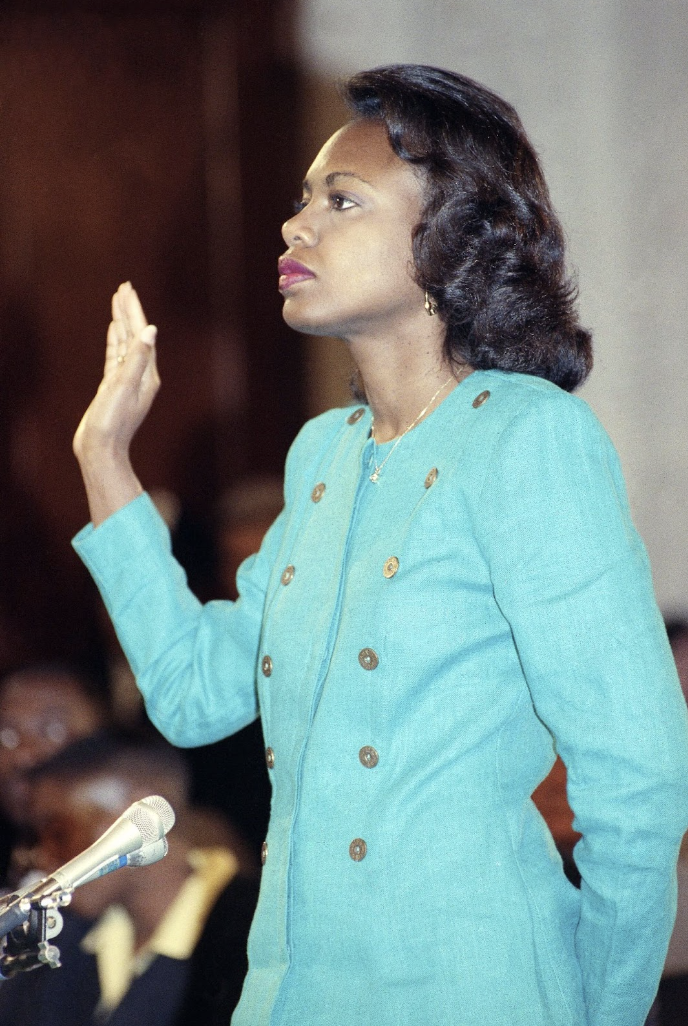By Gabriella Majeski, Summer 2023 Collaborator at Power in Place
Image from: Associated Press via Washington Post
It’s 1991 on the Senate floor. Former coworker of Clarence Thomas takes the stand, testifying against him as she shares details regarding multiple inappropriate sexual advances that Thomas made onto her. Little did Anita Hill know that her testimony would polarize the United States as questions of gender equality, safety in the workplace, and survivor stories began to arise. Due to their publicity as well as the poor treatment Hill faced from the Senate Judiciary Committee, the hearings propelled a record number of women entering politics the following year, coining 1992 as the “Year of The Woman” (Senate.gov). The repercussions of the Thomas confirmation hearings still ripple into political discourse today, making them one of the most influential public displays of gender and racial inequality in the United States.
Anita Faye Hill was born on July 30, 1956, in rural Love Tree, Oklahoma. As the youngest of thirteen children, she spent most of her childhood working on her family farm and heavily indulging in her studies. After graduating high school as valedictorian, she went on to receive a degree in psychology from Oklahoma State University in 1977 (Blatty). Three years later, she earned a law degree from Yale Law School. Her success in education led her to a job at a law firm, which she soon quit for a position with the U.S. Department of Education’s Office for Civil Rights. She served as legal advisor to Clarence Thomas, the assistant secretary of civil rights at the time. It was during this time that Thomas made multiple unwanted sexual advances towards Hill before he was promoted to be Chair of the Equal Employment Opportunity Commission in 1982. Hill left her position with Thomas shortly after in 1983 and began teaching at Oral Roberts University. She joined The University of Oklahoma three years later as its first tenured Black Professor. During her time at The University of Oklahoma, she taught commerce and contract law. However, the projectile of her career would soon shift in 1991 once she took the stand in front of the Senate Judiciary Committee.
On October 11, 1991, Anita Hill testified before an all-white, male Senate Judiciary Committee against her former coworker as he was set to be confirmed to join the Supreme Court. The televised hearings propelled her into the spotlight in front of millions of Americans across the country. As she began her testimony, Hill was met with multiple remarks from the Committee that seemed to attempt to undermine her experience and discredit her argument, deeming her an “unreliable source.” She was shamed by the Committee and the right-wing American public as she described her inappropriate experiences with Thomas in graphic detail. Clarence Thomas denied all of the accusations made by Hill, claiming that the matter was a “liberal concoction” that was meant to circumvent his appointment to the Supreme Court. To this day, Thomas still denies all of the claims, naming Hill his “most treacherous adversary” in his 2007 autobiography, My Grandfather’s Son (Stolberg).
It is important to note that Anita Hill did not stand alone with such allegations; multiple women requested to testify in front of the Committee as well, but were either dismissed or ignored. Ultimately, Clarence Thomas was confirmed on October 16, 1991, by a 52-48 vote, the smallest margin for any judge on the current Supreme Court.
The televised hearings divided American opinions on the matter: some agreed with the Senate Judiciary Committee, believing that Hill made her claims for publicity and national attention. Others were outraged as they watched her leave the courtroom without justice and found the Committee’s treatment of her degrading and sexist. Some even began to wear pins of solidarity that read “I believe Anita” (Bennett). Despite this polarization, one thing stood clear: the outrage caused by the hearings led to a historic number of women running for and winning political positions the following year, coining 1992 as the “Year of The Woman” (Senate.gov). Furthermore, Anita Hill’s testimony is often credited with raising awareness about gender-based violence and harassment in the workplace and served as an early spark to the ignition of the #MeToo movement.
Anita Hill left her position at The University of Oklahoma in 1996 after facing multiple threats to her personal safety, as well as public calls for her resignation. Two years later, she began working at Brandeis University as a visiting scholar. She later became a professor at the institution in 2015 (Tikkanen). She led a private life after being submerged in chaos following the hearings, often shying away from any article, documentary, interview, or publicity regarding her experience. But that all changed with the emergence of the #MeToo movement, as political tensions began to rise within topics of women’s rights, gender equality, and sexual assault awareness. After changing her career focus onto gender equality, she explained in a New York Times article (cite) how she hoped to help other women “find their voice” just as she did. The 20th anniversary of the hearings inspired her to step back into the public eye with her documentary “Anita” (2014). Since the documentary’s release, Hill has remained vocal in her advocacy for gender equality, as well as on the topic of her testimony. In 2019, she received a call from current President Joe Biden, who was a presidential candidate at the time. During the conversation, he apologized for his behavior during the hearings, but according to Anita Hill, sorry was not enough. Action had to be taken before she would accept any apology. In her own words:
“I will be satisfied when I know that there is real change and real accountability and real purpose” (Adams).
It is clear to see that although Anita Hill’s testimony may not have halted Clarence Thomas’ confirmation, her story led to a rise in awareness regarding issues of gender equality in the U.S. Since then, she has inspired thousands of women to find their voice, vocalize their survivor stories, and even join the male-dominated political field to incite positive change and action. With this in mind, it is even more apparent that Anita Hill’s agenda is far from finished if true change is to be made. It is vital that U.S. citizens remember and learn from her story in order to ensure that future objections will be met with inclusion, acceptance and justice.
References
[1] Blatty, David. “Anita Hill''. Bibliography.com. March 30, 2021. https://www.biography.com/activists/anita-hill
[2] US Government. “Year of the Woman”. Senate.gov. 2023. https://www.senate.gov/artandhistory/history/minute/year_of_the_woman.htm
[3] Pruitt, Sarah. “How Anita Hill’s Testimony Made America Cringe-And Change”. History. February 9, 2021. https://www.history.com/news/anita-hill-confirmation-hearings-impact
[4] Tikkanen, Amy. “Anita Hill”. Britannica. July 18, 2023. https://www.britannica.com/biography/Anita-Hill
[5] Adams, Biba. “Anita Hill speaks on waiting nearly 30 years for Joe Biden apology”. Yahoo News. September 28, 2021. https://news.yahoo.com/anita-hill-speaks-waiting-nearly-141502687.html?guccounter=1&guce_referrer=aHR0cHM6Ly93d3cuZWNvc2lhLm9yZy8&guce_referrer_sig=AQAAABKi2mOEXd8MihkhCgAlZcLRdRRUCVNSvHkxn-8mJZ0b0kck8yxHp4xHMLXH6q-QlicvY9FW8VnZuXTdMLMIy443wFHdho_PqqfEGzADkF0zxU1cQTARKCywyee9dBPO7QCsIpqScCq2EHCgvoZbj9GkRjDDUbPwKql2N6ncqKoj
[6] Stolberg, Sheryl. Hulse, Carl. “Joe Biden Expresses Regret to Anita Hill, but She Says ‘I’m Sorry’ Is Not Enough”. The New York Times. April 25, 2019. https://www.nytimes.com/2019/04/25/us/politics/joe-biden-anita-hill.html?module=inline
[7] Bennett, Jessica. “Anita Hill Has Some Perspective to Offer”. The New York Times. September 25, 2021. https://www.nytimes.com/2021/09/25/books/anita-hill-believing.html
[8] Moon, Jeenah. Bennett, Jessica. “How History Changed Anita Hill”. The New York Times. June 17, 2019. https://www.nytimes.com/2019/06/17/us/anita-hill-women-power.html
[9] Stolberg, Sheryl. “Standing by Her Story”. The New York Times. March 12, 2014. https://www.nytimes.com/204/03/16/movies/anita-hill-is-celebrated-in-the-documentary-anita.html
[10] Bennett, Jessica. “The ‘Click’ Moment: How the Weinstein Scandal Unleashed a Tsunami”. The New York Times. November 5, 2017. https://www.nytimes.com/2017/11/05/us/sexual-harrasment-weinstein-trump.html
Gabriella Majeski is a rising sophomore at Brandeis University and intends to double major in politics and women, gender and sexuality studies, as well as a German and legal studies double minor. In addition to her commitment to community service and activism on and off campus, she competes for the Club Gymnastics Team and works as a tour guide. She hopes to attend law school and work in social media marketing for a political campaign after graduation.


